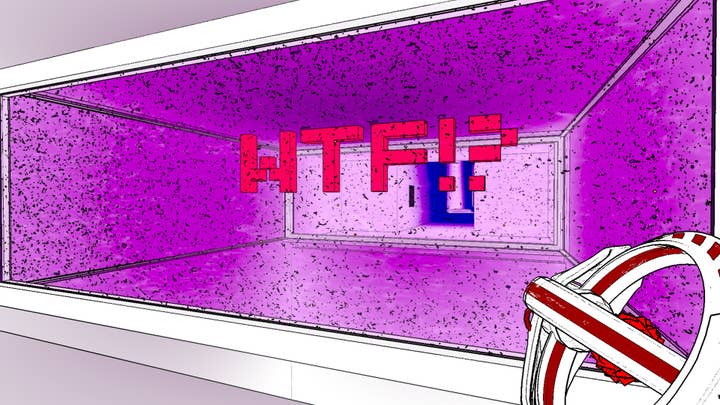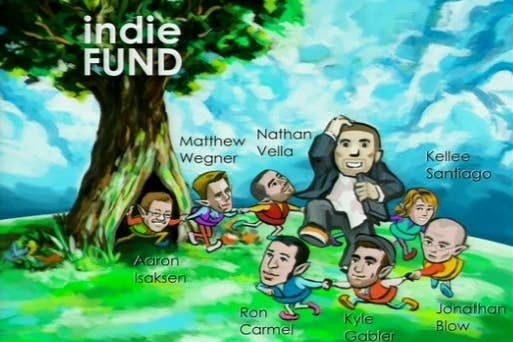Indie Fund: Striving for irrelevance
Nathan Vella, Matthew Wegner, and Aaron Isaksen on balancing fiscal responsibility and creative risk to empower an industry
In 2010, a veritable super group of seven indie game developers formed Indie Fund, pooling their money together to finance up and coming indies. Three years later, the group has funded 12 projects. Most of those are yet to ship and some haven't even been announced, but the first trio of releases--Dear Esther, Antichamber, and Q.U.B.E.--have all made their money back and then some. The fourth Indie Fund-ed release, the Independent Games Festival-winning Monaco, comes out April 24 on Xbox Live and PC.
Speaking with GamesIndustry International at the Game Developers Conference last month, three of the Indie Fund seven--AppAbove Games co-founder Aaron Isaksen, Capybara Games co-founder and president Nathan Vella, and Flashbang Studios founder Matthew Wegner--sat down to reflect on the past three years and how they've adapted to a dramatically growing independent game development scene.

"When we started, the world was a lot different," Isaksen said. "Basically the only way you could get a game funded was to go to a publisher. So now, there's us but there's also Kickstarter, developers who have made some money and are funding other games..."
Despite the broader options available for developers looking to get funded, Isaksen isn't worried about a reduced need for Indie Fund. In some ways, he'd even welcome it.
"If we become irrelevant because there are better deals elsewhere, either via Kickstarter or direct through people's communities, then great."
Aaron Isaksen
"If we become irrelevant because there are better deals elsewhere, either via Kickstarter or direct through people's communities, then great," Isaksen said. "That's kind of a win/success state for us if Indie Fund is no longer required because things have gotten so much better around it. That's fine with us if people don't need our money because they can get the same terms somewhere else."
As for what those terms are, prospective developers sign a contract with Indie Fund (for anyone curious, the group's standard contract is readily available on its website) that sees them given funding in two lump sums. Once the game is released, Indie Fund gets all of the revenue until its initial loan has been repaid. After that point, Indie Fund gets 25 percent of all revenue until the initial loan has been doubled. After that point, the contract terminates and the developer gets all the money going forward. And in cases where the game doesn't make back its money, whatever outstanding amount of the loan remains will be forgiven two years after the game is launched.
A 100 percent return on investment is nothing to sneeze at, but the cap does keep Indie Fund from cashing in when one of its projects hits it out of the park. That's significant, given the trending success of Indie Fund projects. The first Indie Fund release, Q.U.B.E., made back its initial loan money four days after release. Dear Esther recouped its investment in under 6 hours, and this year's Antichamber debuted as the best-seller on Steam, making its loan money back in under an hour.
Just as the ways developers can find funding have changed over the years, so too has Indie Fund's approach to selecting projects. Isaksen said the group has become better at picking safer projects, but notes that they're looking to take bigger risks on more impactful titles because safer projects aren't as interesting. Beyond being a more satisfying endeavor for the funders, it also plays into one of the group's primary goals.
"We have to self-sustain. We're maybe overcautious about wanting to recoup, because that's how we fund more good stuff."
Nathan Vella
"The charter of the fund is helping developers to get and stay independent," Isaksen said. "And some of those submissions just weren't unusual enough, interesting enough. It's like, that's not the pathway from you to independence. That's the pathway to a game that only does kind of OK or fails. So even if we were going to recoup our money, we would look at some projects and say it wasn't going to help that person become independent, that it wasn't interesting enough for us."
That said, the group is explicit that it wants to be fiscally responsible with the money.
"We have to self-sustain," Vella said. "We're maybe overcautious about wanting to recoup, because that's how we fund more good stuff. There is a direct cause-and-effect if we fund something that can't recoup."
And even in that worst-case scenario, Vella said there have been lessons to make the effort worthwhile, both for the fund's founders as well as the independent development scene at large.
"The main reason for doing it, the push forward has been that we can learn as well," Vella said. "We can make our deals better, our contracts better, our terms better, and learn from all this stuff. And every time we do that, the chances of someone not understanding s******* contracts decreases."

That might be a sore spot for Vella, who spoke of the early days at Capybara, when the studio signed a number of bad deals without understanding what they were getting into. That's just one of the reasons the group put its contract online, so any developers with publisher deals on the table can look at them and see how they compare.
"Even if it didn't work out, it's putting pressure on other publisher contracts and making life better for indies," Wegner said.
While their sympathies clearly lie with their fellow creators, the Indie Fund experience has given the group a better sense of what publishers go through when dealing with developers. Wegner talked about a 2009 attempt to back indies that he and some fellow Indie Fund-ers participated in with a larger round of investors. That project never shipped, but Wegner found the process of watching a project crumble from the outside enlightening.
"People would suggest things to solve the tension between us and the developer, and we were like 'You just suggested the exact same thing that we all hate when a big publisher does it.'"
Matthew Wegner
"People would suggest things to solve the tension between us and the developer, and we were like 'You just suggested the exact same thing that we all hate when a big publisher does it,'" Wegner said. "Like, 'Let's take over development and finish it ourselves.' Did you really just suggest that?"
One of the problems was that the deal was set up along the lines of the existing publisher model, with money paid out for monthly milestones and recouped in a traditional way.
"If you have the same constraints, you're going to have the same results when things get tense," Wegner said.
The experience also helped shape Indie Fund's approach. While the team is willing to offer advice and networking assistance, they are conscious not to handhold. As Isaksen said, the goal is to create developers capable of being independent and able to stand on their own, which gets back to one of the fund's ultimate win states. To Indie Fund, a successful project results in a developer that never needs its help again.
This is one in a series of GamesIndustry International interviews with independent developers on the changing role of indies in the industry landscape.

